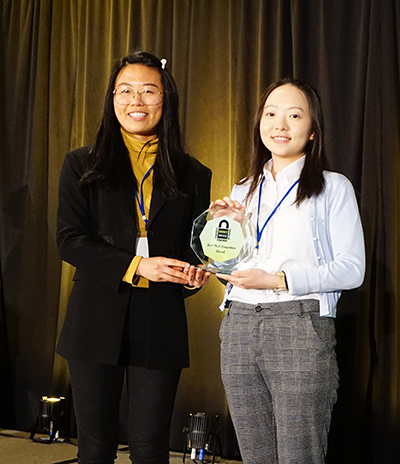EE's Deng Wins Best Ph.D. Competition Award

Shuwen Deng, a recent electrical engineering Ph.D. graduate in the lab of Jakub Szefer, is the recipient of the Best Ph.D. Competition Award at the 2023 IEEE International Symposium on Hardware Oriented Security and Trust (HOST).
The competition featured both soon-to-be graduating Ph.D. students and recent graduates. The judges’ goal is to select the dissertations that are advancing the state-of-the-art research in the field of hardware-oriented security and trust. The objective is to evaluate the quality of the research simply carried out during the Ph.D. program.
 HOST is the premier symposium that facilitates the rapid growth of hardware-based security research and development. Since 2008, HOST has served as the globally recognized event for researchers and practitioners to advance knowledge and technologies related to hardware security and assurance.
HOST is the premier symposium that facilitates the rapid growth of hardware-based security research and development. Since 2008, HOST has served as the globally recognized event for researchers and practitioners to advance knowledge and technologies related to hardware security and assurance.
As computer systems grow more and more complicated, various performance optimizations can unintentionally introduce security vulnerabilities in these systems. The vulnerabilities can lead to user information and data being compromised or stolen. Many of computer processor optimizations often focus on sharing or re-using the processor hardware between different users or programs. This can lead to different types of timing-based security attacks where the sharing or re-using of hardware components influences the timing of the operations performed on the processor. Different timing can be exploited by malicious users to gain information about operations or data of the co-located victim program or user.
Deng presented research that addresses the security threats by developing a theoretical model for cache and TLB timing attacks to help evaluate the susceptibility of different architectures and microarchitectures to timing attacks on caches and TLBs. Further, she presented a benchmark suite built upon the model to test if processor caches, or secure cache designs, are vulnerable to the theoretical vulnerabilities found using the theoretical model.
Deng also illustrated defenses for the TLBs which were developed to address the newly found vulnerabilities. Going beyond caches and TLBs, she discussed research on and evaluation of timing and power-based attacks on the processor frontend.
Deng recently completed a postdoctoral fellowship in the University of Michigan’s Department of Computer Science and Engineering and now serves as an assistant professor in the Department of Electronic Engineering at Tsinghua University.

